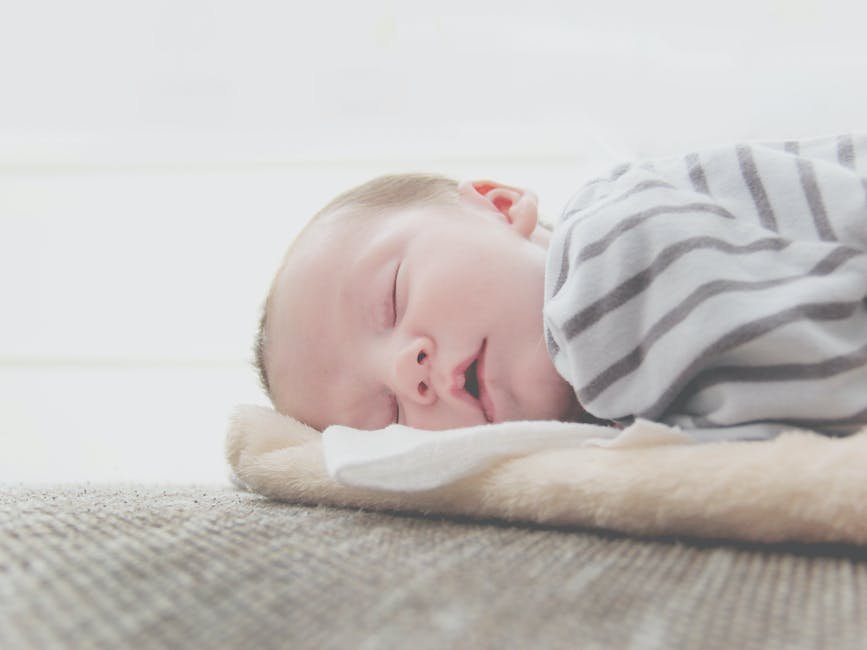
Many children with Autism Spectrum Disorder (ASD) face unique struggles each day, but one of the most prevalent and impactful is the consistent difficulty in attaining a good night’s sleep. Sleep disturbances in children with ASD aren’t a rarity; in fact, they are notoriously common, often causing significant challenges to their well-being and daily functioning. To understand and navigate this complex relationship between Autism and sleep disturbances, it is crucial to dive into the core of each concept separately and then explore their intimate connection. By shedding ample light on this concern, vital steps can be taken to identify and manage sleep issues, ultimately leading to an improved quality of life for children with ASD and their families.
The relationship between Autism and Sleep
Unraveling the Connection Between Autism and Sleep Disturbances
Do you have a child diagnosed with Autism Spectrum Disorder (ASD), and you’re wondering why they might be having trouble sleeping? Well, you’re not alone. Many parents in the same boat are seeking the same answers. Sleep problems are unfortunately common for those with ASD. A recent study from the American Academy of Pediatrics found that children with ASD are two to three times more likely to have sleep problems than typically developing kids.
Let’s delve into the connection between autism and sleep disturbances, to equip you with the necessary knowledge that can help improve your child’s sleep quality and overall well-being.
Firstly, it’s important to understand the fundamental relationship between autism and sleep problems. Autism is a neurodevelopmental disorder, meaning it affects the brain’s usual growth and development. This might also extend to the areas of the brain responsible for regulating sleep, such as the circadian rhythm – our built-in “body clock.”
Our circadian rhythm regulates our sleep-wake cycle. It dictates when we should be awake or asleep, based on light exposure. In some individuals with autism, this rhythm might be disrupted due to alterations in their brain development or sensitivity to light, leading to sleep problems.
Autism also commonly comes hand-in-hand with sensory sensitivities. A child with ASD might be oversensitive to environmental factors like noise, touch, or light, making it more difficult for them to wind down and fall asleep. Lying in bed in our own world of thoughts, sights, and sounds might seem comforting to most of us, but for a child with autism, it can be overstimulating and challenging.
Moreover, children with autism are more likely to have anxiety and difficulty with emotional regulation, which can compound sleep issues. Feeling anxious or emotionally upset can make it hard for anyone to fall asleep, and this is exacerbated in an individual with ASD who may already be dealing with issues related to their circadian rhythm or sensory sensitivities.
When we talk about improving sleep for a child with autism, it’s not always about “fixing” the sleep problem. It’s also about focusing on routines and strategies that help promote better sleep. Establishing predictable bedtime routines, reducing sensory distractions in the bedroom, and addressing any underlying anxiety are great places to start.
In conclusion, if you are a parent with a child with autism and you’re tackling sleep issues, know you’re not alone. Understanding the connection between autism and sleep disturbances is the first step in helping your child achieve good sleeping habits. Seek professional advice if necessary, and remember that while it may be a challenging journey, small steps can lead to significant improvements in your child’s sleep and overall quality of life. Moreover, remember, every child is unique and what worked for one may not work for another. Therefore, it’s important to figure out what works best for your child.

Identifying sleep disturbances in children with autism
Identifying Sleep Disturbances in Kids with Autism: A Closer Insight
Sleep is a fundamental part of our health, no less so for our little ones, especially when they are on the autism spectrum. Children with Autism Spectrum Disorder (ASD) are often more likely to struggle with sleep disturbances, which can affect their overall quality of life. Think of it like trying to watch your favorite show through a fuzzy, static-ridden channel – upsetting and frustrating, isn’t it? That’s likely the feeling that a sleep-disturbed child might be going through.
True, the previous discussions got us into understanding the sleep problems in children with ASD, their relationship with autism, and the role of neurodevelopmental aspects, sensory sensitivities, anxiety, and emotional regulation. We also discussed practical strategies for promoting sleep and when it’s best to seek professional advice.
Now, let’s go another mile further into spotting these disturbances and unique behaviors that signal potential sleep issues.
One of the most noticeable signs is irregular sleep and wake patterns. A child with autism may wake frequently through the night or early in the morning, disrupting that crucial sleep-wake cycle. On the flip side, they could have difficulty falling asleep at the expected regular bedtime or even display hyperactivity closer to bedtime, an intricate dance of the body fighting off the sleep it needs.
Secondly, abnormal sleeping behaviors or sleep-associated medical problems may also suggest disturbances. This includes occurrences like sleepwalking, having nightmares or night terrors, sleep apnea, or even insomnia. If your child exhibits any of these, it’s highly probable they’re dealing with a kind of sleep disturbance.
Children with autism might also experience parasomnias – unusual happenings during sleep. This encompasses behaviors like abnormal movements or behaviors such as rhythmic rocking, even when asleep. Keep an eagle eye out, for these non-standard moments while they should be in the land of Nod might be more significant than they seem.
Another telltale sign could be daytime sleepiness and fatigue. If your child is consistently tired, even after a full night’s sleep, it could reflect an underlying sleep issue. They could also be more irritable or showing changes in their behavior, suggestive of the pesky sleep gremlin at work.
Lastly, self-injurious behaviors might signify a sleep disturbance. Any sign of physical harm, like head-banging or hand-biting, might be an alarm bell that your child’s sleep is troubled.
While these signs don’t strictly pin down to sleep disturbances (as they could tie into other aspects of autism itself), your gut feeling as a parent is often your best guide. This nudge could be what unlocks better sleep and better life quality for your child.
Now, remember, observing these signs is just step one. The next is getting professional help, as individualizing interventions for every unique child with autism is crucial. They are our guiding light, our cherished superheroes. Here’s to understanding them better and making their worlds a little brighter.
So, here’s a warm virtual hug to all the wonderful parents bracing the storm gracefully. As you continue on this remarkable journey, stay persistent, stay patient, and most importantly, don’t forget to seek the help that you may need. You don’t have to do it all alone.

Causes of Sleep Disturbance in kids with Autism
Considering the natural aspects of autism, it is also important not to overlook the possibility of gastrointestinal disorders contributing to sleep problems in children with ASD. Many children on the spectrum show symptoms like chronic constipation, acid reflux, or other digestive disorders that could be disrupting their sleep. A child who is suffering from physical discomfort naturally will have difficulty achieving restful sleep. For this reason, integrating a well-balanced diet and probiotics, under the guidance of a medical professional, can be of tremendous help in assuaging some of these symptoms and improving sleep quality.
Yet another possible factor to consider would be medical conditions, such as sleep apnea. This is known to be common in children with autism. Sleep apnea is typified by repeated interruptions to breathing during sleep and is a significant cause of disturbed sleep. Therefore, recognizing the symptoms and seeking timely intervention from a pediatric sleep specialist becomes crucial.
Moreover, one other significant factor is the presence of Attention Deficit Hyperactivity Disorder (ADHD) in many children with autism. Many symptoms of ADHD such as hyperactivity and restlessness can make it harder for kids to settle down, relax and fall asleep — thus causing disturbed sleep patterns.
Particular medications used to manage autism-related symptoms could also potentially have side effects that include insomnia or sleep disturbances. Therefore, collaboration with the healthcare provider is crucial to work out the right balance and dosage of the medication. It’s essential to make sure that the benefits outweigh the side effects.
Yet, understanding the sleep problems that children with autism experience is just half of the equation. This awareness, tranquil patience, abundant love, and obvious hard work that goes into their caregiving are truly commendable. Using this understanding practically, creating a supportive environment, and devising a personalized sleep management plan can make a substantial difference in the sleep patterns of these children. Bringing in slight changes to the diet, observing them for any signs of discomfort, or even having a predictable nighttime routine can go a long way in bringing about peaceful nights and more energy-filled days.
Utilizing techniques such as visual cues, calm-down activities, and positive reinforcement can promote better sleep hygiene and set a relaxed tone for bedtime. It might also be helpful to use tools like weighted blankets or sound machines, found effective by many parents, to comfort children with autism.
Seeing children struggle with sleep disturbances can sometimes feel overwhelming, but remember, you are not alone on this journey. Many resources and online communities are out there offering support, understanding, and most importantly, hope.
Equipped with the right knowledge and strategies, parents of children with autism can pave the way to better, more restful nights — because after every restful night, one wakes up to a world filled with endless possibilities.

Coping strategies and treatment for Sleep Disturbances in children with Autism
Beyond the basics, there are a host of factors that might be wreaking havoc on your child’s sleep. Children with autism may suffer from gastrointestinal issues, and these can heavily impact sleep. Bloating, heartburn, and discomfort are not conducive to a good night’s rest. Consider speaking to a specialist about probiotics and a diet that minimizes gastrointestinal troubles, this can, in turn, improve your child’s sleep quality.
Here’s another thing, sleep apnea is prevalent in children with autism. Unchecked, it can lead to irregular breathing patterns and even pauses in breathing during sleep – significantly impacting the quantity and quality of your child’s sleep. Incorporating checks for signs of sleep apnea during your child’s regular check-ups can provide early diagnosis and timely intervention, ensuring that this condition does not further hinder your child’s sleep.
Attention Deficit Hyperactivity Disorder (ADHD), often comorbid with Autism Spectrum Disorder (ASD), may also play a role in sleep disturbances. Children with ADHD often have inconsistent sleep patterns and it affects their ability to fall asleep and stay asleep. Receiving a comprehensive diagnosis that considers comorbidities like ADHD can provide insights which lead to more targeted and effective management strategies for your child’s sleep problems.
Moreover, several medications used to manage symptoms associated with autism can cause sleep disturbances. If you notice a change in your child’s sleep pattern after starting a new medication, it’s important to discuss this with their doctor – there may be alternative medications or adjustments that can be made to lessen the impact on their sleep.
Creating a supportive environment tailored specifically to your child’s needs can greatly enhance their sleep quality. A personalized sleep strategy for your child with autism can incorporate elements that comfort them and promote sleep hygiene. For instance, visual cues that guide them through bedtime routines, calming activities before bedtime, cozy bedding, and even white noise machines that blanket environmental noises can all be part of your child’s unique sleep management plan.
Weighted blankets have been useful for some families, providing a swaddling-like sensation that is comforting and sleep-inducing. These blankets create a Deep Touch Pressure (DTP) effect that stimulates the release of serotonin, a hormone that helps regulate sleep.
Lasty, remember: you’re not alone. There are robust resources and supportive communities online filled with parents who are facing a similar journey. They can not only provide a sympathetic ear but also offer strategies that have worked for them. Use these communities as a source of support, inspiration, and understanding.
Ultimately, treating sleep disturbances in children with autism is quite complex because of the unique traits that each child presents. But with a bit of patience, a whole lot of love, and the right strategies, you’ll be able to navigate this wellness area, ensuring they have the restful sleep they need.

The impact of improving sleep on Autism
Sleep Quality and Autism: Deeper Associations and Further Strategies
Having explored various aspects of sleep disturbances in children living with autism in the first part of this article – their relationship with neurodevelopmental aspects of autism, sensory sensitivities, anxiety and emotional regulation, and also discussed the strategies available for managing it, we now delve deeper into this issue. We strive to unveil more refined narratives concerning sleep disorders and autism, the intertwined relationship with other health conditions, and the groundbreaking solutions that can potentially turn the tides for our little warriors.
Remarkably, there seems to be a speculated link between gastrointestinal disorders, often reported in children with autism, and disturbed sleep. Children with chronic stomachaches and bowel issues may awaken frequently, a fact that makes practical, intuitive sense, doesn’t it? Therefore, maintaining a balanced diet, with a regular probiotics regimen could be a helpful strategy. It’s something for parents to discuss with professionals given its potential to work magic for sleep quality improvements!
If we delve a notch deeper, we might be surprised to find a higher prevalence of sleep apnea in children on the spectrum. Timely diagnosis of this condition can be the linchpin to better sleep, as left unaddressed; it can lead to fragmented, unrestful sleep and even behavioral issues during the day. After all, every child deserves a good night’s sleep!
Isn’t it fascinating how the pieces of a puzzle fit together? Even Attention Deficit Hyperactivity Disorder (ADHD), a condition often co-existing with autism, could be a critical player impacting sleep patterns. While parents might face the delicate challenge of distinguishing ADHD symptoms from those related to autism, understanding this correlation could be an important step towards managing sleep issues.
In the quest to give our children the best, many parents turn toward medications to manage autism-related symptoms. However, some medications might inadvertently disturb sleep. Always engage with health care professionals to understand the pros and cons of each medication, adjusting dosages or timings as required with their advice. There’s no one-size-fits-all; solutions are as unique as our children!
Moving with patience and love, understanding your child’s unique needs forms the cornerstone of addressing sleep difficulties. Providing an environment conducive to sleep, creating customized sleep strategies which may include visual cues or calming bedtime tummy massages, can go a long way towards nurturing better sleep. More innovative techniques, like using weighted blankets to create a sense of security, have proven beneficial for many autistic children. That’s the beauty of the vast realm of innovative solutions out there waiting to be discovered!
Last but not the least, do remember, dear parents, you’re not alone on this journey. There are resources and support systems available, filled with people ready to reach out, understand, and lend a helping hand. Raising a child with autism may come with its unique challenges, but the reward lies in facilitating their journey to living life to the fullest, and that includes a peaceful night’s sleep.
Stay strong, keep learning, keep loving! Because behind every unique challenge lies an extraordinary opportunity for growth. When faced with complexities while treating sleep disturbances in children with autism, maintain boundless love, patience, and the right strategies. After all, doesn’t every cloud come with a silver lining?

Understanding the relationship between Autism and sleep disturbances is not just an academic exercise but a path to improving the quality of life of children with ASD and their families. The journey towards better sleep can seem daunting, but armed with knowledge, understanding, and practical advice, it becomes an achievable goal. Sleep disturbances need not be a lifetime sentence. Promising strategies, both behavioural and medical, have been proven effective. The positive impact of adequate sleep extends beyond mere relief from exhaustion. It encourages better emotional regulation, enhanced cognitive functioning, and overall improvement in daily living skills in children with ASD. By fostering a better sleep environment and routine, we advance closer to our ultimate goal: ensuring every child with ASD can thrive in their own unique way.




